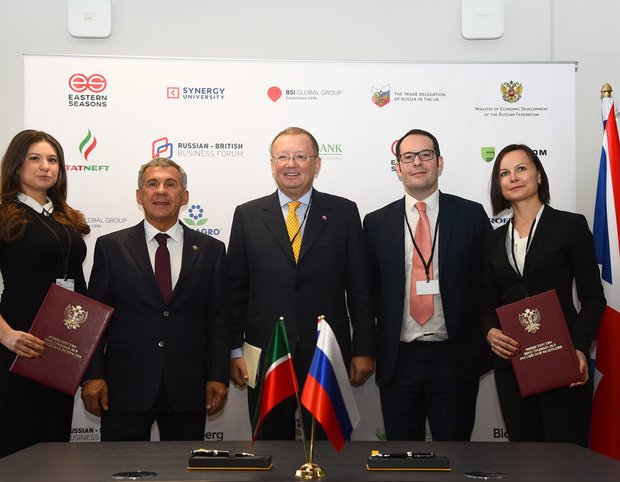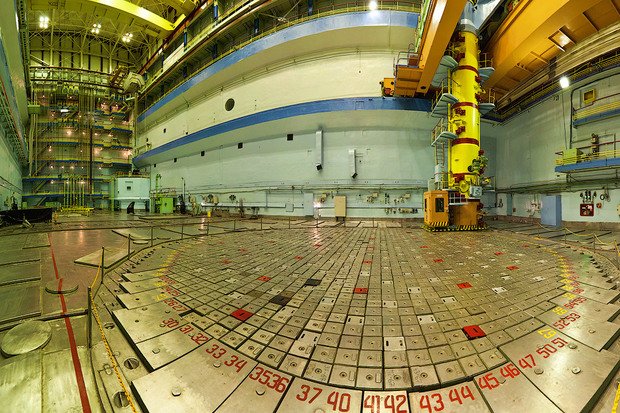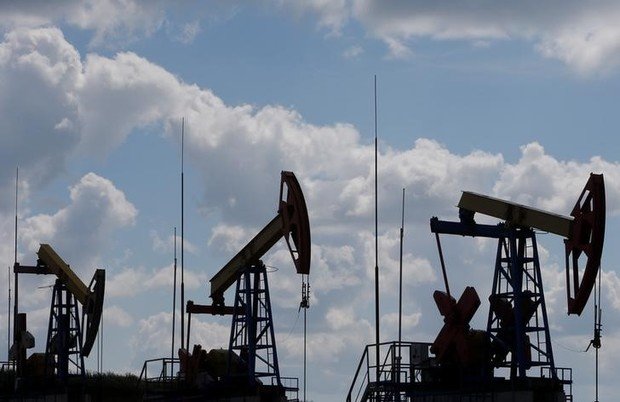French leave: Britain hooked on gas needle, while Moscow needs machine tools and whiskey
After a threefold fall in external turnover of Tatarstan and Great Britain in 2017, it just began to grow…
After the sudden cooling in relations between Great Britain and Russia caused by Russian ex-spy Sergei Skripal's poisoning scandal, Realnoe Vremya's analytic staff decided to acquaint with the structure of export and import of Russian-British trade. We also studied economic links of the United Kingdom with Tatarstan (it turned out after a threefold fall in external turnover of Tatarstan and Great Britain in 2017, it just began to grow). Oil and gas are the biggest Russian and Tatarstan export sources to Britain – the republic's export to Great Britain accounts for 92,7%. At the same time, industrial equipment trade balance in Russian-British trade is negative for both Moscow and Kazan.
How Rustam Minnikhanov went to England together with ''Russian embassy''
To start with, we will notice that the Russian-British Business Forum last November, which was the third, preceded the ''cold trade war'' with England that is also participating in the sanction war against the Russian Federation. It was from 28 to 29 November and organised by the Russian Ministry of Economic Development, trade representative office and Embassy of the Russian Federation to Great Britain with the aid of Russian and international partners to discuss the development of trade and investment relations of the two countries. Tatarstan President Rustam Minnikhanov became one of its key participants besides Boris Titov (who wasn't a Russian presidential candidate but an ombudsman) and Deputy Minister of Economic Development of Russian Federation Oleg Fomichev.
His Royal Highness Prince Michael of Kent took part from the British side. Having arrived in the forum with an obvious business mission to develop cooperation in both trade and join production of companies of Great Britain and Tatarstan, Rustam Minnikhanov claimed that the Republic of Tatarstan, as one of the advanced regions of Russia, ''had a high share of import of cars and equipment of Great Britain, brought several industrial goods, while Tatarstan enterprises and banks having direct links with English partners used the latest British technologies in production''.
Very Tatarstan supplies oil and oil products, plastic and goods made of it, rubber, rubber goods and other products to Britain. In the Tatarstan president's opinion, ''Tatarstan could interest British business by opportunities in such spheres as power engineering and petrochemistry, automotive industry and production of car components, machine building and aviation industry, new materials, innovative development, IT and other high technologies, agro-industrial complex, engineering, medicine, Islamic banking.''

It was said that by late 2017, turnover between Great Britain and Russia would increase by more than 20% and exceed $12 billion with a noticeable trend for diversification of both Russian export and British import. At that moment, Fomichev dreamed the turnover between the two countries – ''if the current dynamic remained high'' – could grow five times until 2022.
It's obvious Sergei Skripal's poisoning scandal could put paid to such plans. So 2017 will become the best year for British-Russian trade, with a positive balance, when the Russian Federation sold goods and services to Great Britain at $4bn, or 1,7 times more than Britain did to Russia. Russian exports to Great Britain grew by 29,4% during the first 9 months in 2017, to US $6,5 billion in comparison with three quarters in 2016. They also started to say that Russian non-resource-based exports to Great Britain were sustainably growing, its volume amounted to US $3,1 billion by that moment (48,5% in exports). As it turned out, to put it mildly, the latter, unfortunately, isn't really so.
Oil and gas – top export sources to Britain
Judging by the latest date of external turnover of Russia and Britain, which Realnoe Vremya's analytic staff studied, the positive balance in 2017 totalled not 4 but $4,6 billion (the difference between the volume of Russian goods sold to Britain and the volume of British products sold to Russia). The total volume of Russian-British trade (exports and imports) made up $12,7 billion, that's to say, 700 million more than it was forecasted by Russian authorities at the forum last November.
The volume of exports to the United Kingdom in 2017 was $8,6 billion. Russia, of course, sells more oil and gas to Britain for $6 billion excluding that feedstock also accounts for other important export sources.
For instance, the Russian Federation sold noble metals for $1,6 billion, where only gold had 1 billion. Inorganic chemical products, rare-earth metals and radioactive elements or isotopes cost $187 million. There was sold wood or charcoal for $123,7m, black metals for $107,7m, copper – for $66,2m, ore and slag – for $59,6m, aluminium – $29m. So resource-based exports accounted for $8,3bn or 95,4% of all exports.
Noticeable categories also had paper and cardboard ($36,5m), fertilisers ($27,2m), some classified goods ($28,3m), alcohol ($22,76m), plastic ($20m).
Russian equipment sold to United Kingdom in 2017 for almost $40m
Nuclear reactors and boilers, which the Russian Federation sold to Britain for $37,8m (9 th place in export volume) is the most important non-tradable category that speaks about the sale of hi-tech products. However, to avoid confusion, we will notice that according to the decision of the Board of the Eurasian Economic Commission on 16 July 2012 ''On Establishment of Common Commodity Classification the Eurasian Economic Union's Foreign Economic Activity'', the group No. 84 has not only ''Nuclear Reactors, Boilers, Equipment and Mechanical Appliances; Their Parts''. Particularly in 8401-8487, besides reactors, it has steam generators, gas generators, turbines, internal combustion engines, turbojet engines, propulsion units, pumps, fridges, industrial equipment with electric heating, centrifuges, lift trucks, bulldozers, agricultural machinery, etc.
The second big tradable category ranks only 16 th concerning its export volume: optical instruments, photographic, cinematographic and measuring, control, precision, medical and surgical devices and tools were sold for $18m. It has a wide range – from glasses and binoculars to automatic control devices for civil aviation and different oscilloscopes and counters.
E-cars and equipment for $17,2m were exported to England. The range of this export category has quite a long list of goods: engines and electric generators, transformers, electromagnets, accumulators, vacuum cleaners, phones, bulbs, integrated circuits, etc.
The Russian Federation sold produce of the agro-industrial complex to Britain for $35,8 million.
As the Russian Ministry of Economic Development noticed last year, demand for goods of the chemical industry almost doubled (3,7% in export structure), demand for different Russian mineral products increased almost 1,5 times. Demand for metals and goods made of them grew by 15,3% (3,2% in export structure), while the export of noble metals and stones rose almost twice (17,4% in export structure).

Oil industry also accounts for 92,7% of Tatarstan export to Great Britain
The share of Tatarstan in Russian export to Britain is 2,7%. As well as in Russia, in general, the oil industry accounts for 92,7% of Tatarstan export. In 2017, 457,4m kg of mineral fuel, oil, products of distillation, bitumen for $218,7m were exported from the Republic of Tatarstan to Great Britain in 2017 (a curious fact: British import of oil, bitumen and mineral fuel to Tatarstan also exists, it was $9,3 in 2017).
Other exports of the Republic of Tatarstan are tiny in comparison with oil. Sale of plastic and goods made of it for $13m is on the second place. Tatarstan sold organic and chemical compounds for $2,3m, rubber – for $733,24k, black metal products – for $509,000, wood – for $220,000. Speaking of hi-tech products, in 2017, Tatarstan sold Britain optical, control, precision and medical devices for just $165,800, machines – $113,800, electric appliances – $11,600.
Balance of industrial equipment sale for Moscow is negative
The volume of import to the Russian Federation from the United Kingdom in 2017 was just $4bn, that's to say, twice less than Russian export. Land transport, i.e. cars or trucks, have the biggest share of British import: in 2017, London sold them to the Russian Federation for $744,8m. It includes sale of agricultural tractors, buses and cars, buggies and bicycles and their components.
It's curious but the most expensive tradable goods of the Russian Federation – sale pf nuclear reactors, boilers, equipment and mechanical devices – is 18 times weaker than the same British export category. In 2017, Britain sold nuclear technologies to Russia and Russian companies for $693,3m. In other words, the balance of industrial equipment for Russia, unfortunately, is negative in this sense.
The third biggest import category of Britain is pharmaceutics (medications), which the English sold Russia in 2017 for $592,8m, or the goods whose sum is almost 100 times bigger than the volume of Russian medications sold to Great Britain.
10 times more ''Russian vodka'' sold to the British than ''Scotch whiskey''
Russia is less successful than Great Britain in other hi-tech categories too. London sold us e-cars and equipment, including audio equipment for $271m (to compare, Russia export of electric appliances to Britain amounted to just $17,2m).
The English sold optical, photographic, measuring and other devices for $168 (while Russia sold such products to Britain for just $18,7mn). Britain sold plastics for $165m (Russia did to Britain – $165m).
If we compare alcohol categories, as it's known, relative ''Russian vodka'' was sold to the British for $22,7m, while they sold relative ''Scotch whiskey'' for $250m. Here we can remember a contract at a cost of 76m rubles on purchasing Scotch Whiskey 3YO distillate, which was signed with Scottish Ian MacLeod Distillers Ltd. Tatspirtprom got the first lot of the whisky distiller last December. The distillate will be used to make whiskey named Glen Rivers.
In total, according to the Russian Ministry of Economic Development's data, import from Great Britain in three quarters in 2017 grew by 18,7% in comparison with the analogous period in 2016. It was also said ''due to the revival of industrial production in Russia, demand for British cars and equipment grew (48,9% in import structure) by 21%''. The share of chemical products in the import structure is 34,1%. Food and agricultural feedstock (8,9%) is on the third place in the structure.
After a threefold fall in external turnover of Tatarstan, it just began to grow
British import to Tatarstan in 2017 is $103,8m. So British-Tatarstan trade balance is also positive (which is no surprise considering the biggest leaning in resource export of Tatarstan) and is $132m (so Tatarstan sells $132m goods more than it buys from British producers). The overall volume of Tatar-English trade (both export and import) was $340m.
According to the Tatarstan Statistics Service, it is very and very small. Before the crisis in international relations and sanction war, external turnover of Tatarstan with Great Britain was evaluated at $658m in 2014. In 2015, it reduced 1,7 times to $377,6m. However, in 2016, it was $219,1m, three times less than in 2014.

So in 2017, Fomichev and Minnikhanov correctly evaluated the dynamics of trade relations by calling it a ''gradual recovery of business activity''. On the other hand, if we compare external turnover of Tatarstan with other European countries, Great Britain is far from being its most important partner. For comparison, turnover with Germany in 2016 was $1,8bn having reduced in 2016 to $1,1bn. The turnover with Italy in 2014 made up $1,9bn by reducing in 2016 to $262m.
Will Britain be able to refuse Russian gas and will Tatarstan producers refuse British equipment?
The key categories of British import – equipment, cars, appliances – are the goods that the Russian Ministry of Economic Development of the Russian Federation wrote about last November when it said that ''due to the revival of industrial production in Russia, demand for British cars and equipment rose''. Equipment and transport in the structure of British import to Tatarstan have 81,3%.
It needs to be remembered that Tatarstan purchased different services from British companies. For instance, last year, Kazan Federal University signed a contract with Scholarly Publishers Association for 14,4 million rubles, with British SciTech Solutions, which was founded in 2013 to facilitate molecular beam epitaxy (MBE) research, for 10 million rubles, with British Stokes & Jolly consulting firm for almost 2 million rubles.
In conclusion, we can say oil and gas are major export in both Russia, in general, and specifically Tatarstan. Non-resource-based categories still don't play not only a key but an important role. And it's unlikely to change in the short run. On the contrary, equipment, industrial products, technologies are the foundation of British import of Russia and Tatarstan, not feedstock. In case of further cooling in relations between the countries, Russian and Tatarstan producers will have to look for other equipment and transport manufacturers. But Britain won't find it easy to refuse Russian gas if we assess the current supply volumes to Foggy Albion.